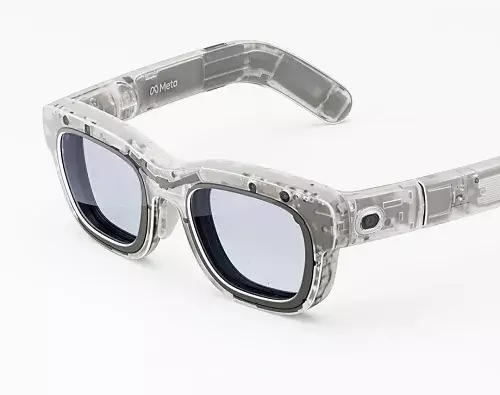As we stand on the precipice of a new technological revolution, augmented reality (AR) is poised to become a pivotal player in our digital interactions. Meta, the tech giant formerly known as Facebook, has taken a bold step forward with its Orion AR glasses, slated for a 2027 consumer release. With the device still under development and testing among select developers, Meta’s vision seems anchored in the aspiration to redefine not just the way we consume media but also how we interact with the world around us. When you consider the historical trajectory of computing devices—from bulky desktop setups to sleek smartphones—the ambitious leap to wearable AR technology is a fascinating next step.
Technical Innovation Meets Fashion
One of the most pressing challenges in designing wearable tech is blending advanced functionalities with user-friendly aesthetics. Meta’s Orion glasses are no exception. Recent disclosures highlight the use of a complementary “puck” device, which serves a dual purpose: powering the glasses and enhancing their computational capabilities while keeping the glasses themselves lightweight and streamlined. Yet, the initial designs still appear somewhat bulky—a testament to the hurdles that remain in miniaturizing complex technology. Nevertheless, the mere fact that Meta has recognized these challenges and is actively addressing them is heartening. The aim is to make the Orion glasses as fashionable as they are functional, ultimately appealing to the masses.
Learning from Market Trends
Meta’s approach shows an insightful understanding of the current market. The success of its Ray-Ban smart glasses proves that there is a substantial consumer appetite for stylish and functional eyewear integrated with smart technology. This pivot to attractive design in technology is not just a marketing gimmick; it’s a strategic maneuver grounded in consumer behavior. People want tech that enhances their lives, not distracts from them. The recent trend toward wearable devices underlines this reality, further highlighting how a device can be both a style statement and a practical tool.
Meta seems poised to extend this appeal into the realm of AR. By embedding AI capabilities in the Orion glasses, the company hopes to accelerate user engagement, making these devices more than just accessories but essential tools for everyday life. As AI becomes an integral part of the user experience, enriching the way consumers interact with their environment, the potential for widespread adoption becomes increasingly tangible.
Pricing Strategies and Competitive Landscape
Intertwined with technological innovation is the all-important question of affordability. Meta’s CEO, Mark Zuckerberg, has a clear objective: to make these AR glasses accessible to a broader audience, significantly underpricing competitors like Apple, whose VisionPro retails at a staggering $3,499. While striving for a price point comparable to modern smartphones is an admirable goal, it also raises questions about the sustainability of that model in a landscape shaped by ongoing global trade issues. Meta’s manufacturing strategies will undoubtedly be tested as it grapples with sourcing components amid geopolitical tensions.
In striking this balance, Meta appears committed to a strategy where early adopters’ feedback will drive future iterations of the glasses. This way, the focus is not just on getting the product on the market but ensuring that it resonates deeply with its users. As the technology evolves, the real task will be sustaining interest while managing production costs.
Looking Toward the Future
Engaging with the potential of AR technology invites us to reimagine our daily routines. Zuckerberg’s assertion that AR glasses could eventually surpass mobile phones as the primary connective interface feels ambitious yet plausible. With our smartphones increasingly tethered to our physical interactions, the idea of AR glasses seamlessly integrating digital experiences into our real-life interactions is both revolutionary and thrilling. Should Meta successfully navigate the imminent challenges, the Orion glasses have the potential to redefine how we perceive work, entertainment, and social connections.
Meta’s relentless focus on integrating advanced functionality into stylish and user-friendly designs demonstrates a clear understanding of consumer desires. As the company moves closer to its 2027 launch, anticipation builds not just for a product, but for the transformative experience it promises. In the race toward a more augmented reality, Meta’s Orion glasses could very well set the benchmark for the future of personal technology.

